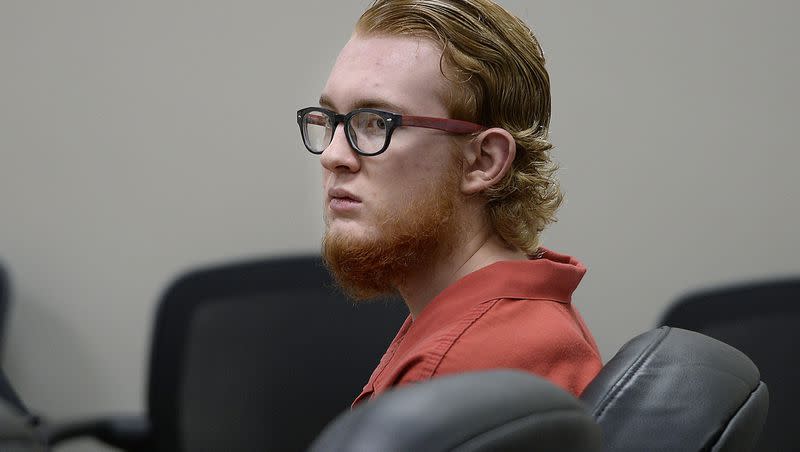Spanish Fork man who assisted in classmate's suicide wants to appeal his sentence

A man who was sentenced to a term of five years to life in prison for helping his classmate at Spanish Fork High School kill herself is now trying to appeal that sentence.
Tyerell Joe Przybycien, 24, admitted to child abuse homicide, a first-degree felony, and was sentenced on Dec. 7, 2018. At the time, he admitted to buying rope, building a pedestal, tying a noose and speaking to the 16-year-old girl as she passed out and died.
On Tuesday, the Utah Court of Appeals heard arguments around whether the time for him to appeal his sentence has already passed. Fourth District Judge James Brady ruled against allowing him to appeal after the 30 days typically given to appeal, in March 2022.
A unique case
Jchandra Brown, 16, was a cheerleader who loved Batman and playing with her young nephews. Her mom said she had been making prom plans before she hung herself in Payson Canyon in May 2017.
Utah County prosecutor Chad Grunander said at the sentencing that Przybycien, at 18, "pounced on her suicidal ideations and exploited them." He was initially charged with murder, but Przybycien pleaded guilty to child abuse homicide as part of a plea deal.
Utah's criminal code in 2017 did not address penalties for assisting with suicide, but in 2018 lawmakers added the offense to the manslaughter statute. Manslaughter charges are typically second-degree felonies and carry a maximum sentence of one to 15 years in prison.
At the sentencing, Przybycien said that he "doesn't deserve pity."
A statement read in the hearing where he pleaded guilty, which Przybycien said was factual, said he told officers, "I feel like I did murder her. ... That's what it is. Because I helped her so much. That was my plan."
Later, the statement said, he wrote on a paper, "I have changed the world" after reading an article about rising youth suicides. Prosecutors said he told friends before Brown's death that helping someone kill themselves would be "like getting away with murder."
Appellate arguments
A memorandum filed by Michael Palumbo, Utah assistant solicitor general, said Przybycien was informed about his right to appeal before and at his sentencing, and he did not file in the allotted 30 days but waited almost two years before asking for the ability to appeal.
Przybycien claimed his attorney did not inform him of everything or discuss his right to appeal after the sentencing, but Palumbo said the judge was correct to reject the request.
"To find counsel ineffective on those grounds would impose a mechanical rule on all defense counsel to meet with a defendant after sentencing," the memorandum said. It argued allowing the appeal would burden defense counsel in other cases and "open a floodgate of untimely appeals."
Przybycien argued in district court that his attorney should have raised the possibility of appealing his sentence based on the 2018 bill, HB86, which added helping someone commit suicide to the manslaughter laws.
Palumbo, however, said Przybycien's trial attorneys advised him of the law at least five times before and after it went into effect, which was before his sentencing.
Douglas Thompson with the Utah County Public Defender's Association, who represents Przybycien, argued that the case should not be dealt with through a "simplified appeal" but should be given a full briefing.
On May 10, 2022, his memorandum said, the court determined the case involves a "novel issue" that has not been considered by any appellate court in Utah — specifically, whether a consultation about the advantages and disadvantages of an appeal is an important part of notice about appeals.
Thompson's memorandum said the district court declined to consider whether Przybycien's attorneys consulted with him about issues that could be raised in an appeal when making the decision.
"Being advised of the right to appeal ... is not the same as post-judgment consultation about the pros and cons of an appeal on the specifics of the case, and an earnest attempt to determine the defendant's wishes with respect to the right to appeal," the memorandum says.
The memorandum argues that attorneys have a duty to consult about an appeal when there is reason to think that their client is interested in appealing or if there are grounds for an appeal.
In this case, Thomson said Przybycien did not get the sentence his attorneys requested, and his attorneys did not talk to him after the outcome about a possible appeal.
What's next?
The Utah Court of Appeals is now considering the case and will release a written decision which will either allow the appeal to move forward or affirm the district court's ruling that he cannot appeal his sentence.
Przybycien has also been serving a sentence of zero to five years for attempted sexual exploitation of a minor, a third-degree felony, which is running concurrent with the sentence in this case.
It has been almost five years since his sentence, so Przybycien could be a candidate for parole as early as later this year.

